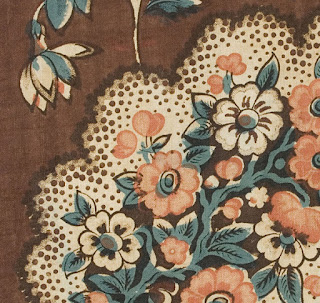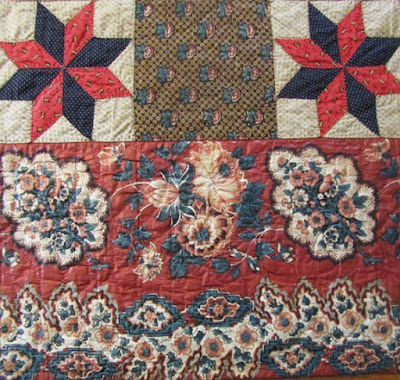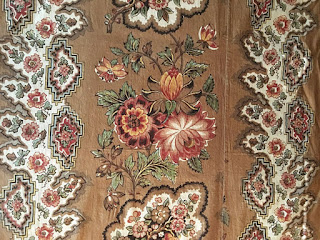Massachusetts quilt in the collection of Old Sturbridge Village
The pieced and appliqued cactus blossom is one of my favorite patchwork patterns. You see it very early in the rage for red and green quilts in the 1840s.
Somebody couldn't let go of the old idea of cut-out chintz so she combined the new idea of conventional applique cut from calicoes with some Broderie Perse.
The wider leaf and bouquet strip alternates with another rather strange stripe. The Victoria & Albert Museum has a piece and their captions says:
"The narrow stripe has flowers with jagged outlines suggesting woven shawls or Berlin woolwork."
It's one of those British prints that seems to have been imported to American ports
in the 1840-60 period....but only in the North?

in the 1840-60 period....but only in the North?

Here it is in a border on a star quilt.
In a red colorway.
In a white colorway in a very worn and once beautiful quilt recorded
in the Minnesota project, made by Joanna Murphy Johnson of Maine.
The Alice T. Miner Museum in Northern New York has
a great wholecloth version on a bed.You get an idea of the scale of the print.
Their print is particularly pretty with many colors in the florals...
but no dots.
The V & A calls it a "dress fabric of roller printed cotton, England, ca. 1838-1840,"
which seems consistent with the American quilts that look to date from soon after
that.
See their piece here:
I have photos of five different color ways.
By Betsy Baker Schillinger of Amagansett, New York
One last wholecloth quilt recently posted on the Quilt Index by
the New York Project.













Beautiful fabric and uses in the quilts
ReplyDeleteWow! What a lovely print and interesting subject! The quilts are pretty wonderful.
ReplyDeleteYes, that is an extravagant print.
ReplyDeleteFun to see the different ways it was used, maybe you could call that 'chintz improv'?
what is referred to as leaf I would call doily... but ... does that matter?
ReplyDelete